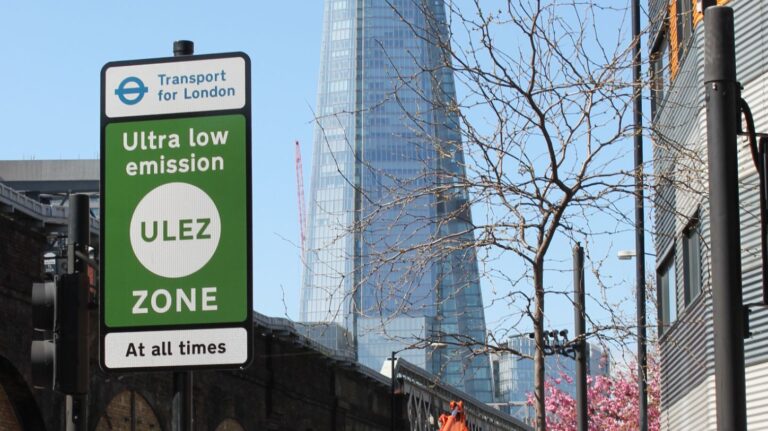The scrappage scheme for vehicles that do not meet Ultra Low Emission Zone (ULEZ) standards will close in three weeks, Transport for London (TfL) has said.
Some £186m has reportedly been paid out to almost 54,000 successful applicants to scrap older, more polluting vehicles that otherwise would pay £12.50 per day to drive in London.
According to TfL, less than a third of the 61,000 applications for vans and minibuses were successful compared with nearly half of those for 75,000 cars and motorcycles.
Mayor of London Sadiq Khan said: “I am proud that the scrappage scheme – the biggest in the UK – has supported so many Londoners to switch to cleaner, greener vehicles.”
Drivers living in a London borough that own a non-compliant vehicle can claim up to £2,000 for a car and up to £7,000 for a van or minibus for small businesses.
Charities using minibuses can claim up to £9,000 while disabled Londoners with wheelchair-adapted vehicles can receive as much as £10,000.
The final day to apply is 07 September 2024 with any application made before the deadline “guaranteed to be processed and reviewed for eligibility”, TfL said.
In addition, it is proposed that the grace period for minibuses used by not-for-profit organisations for community transport is extended from October 2025 to October 2027.
Grace periods for community transport and disabled Londoners remain open until October 2027.
The scheme, which was orginally launched in January 2023, was expanded to most Londoners on 04 August 2023, ahead of the expansion of the ULEZ at the end of that month.
Almost £70m was paid to the owners of more than 36,000 cars and motorcycles while almost 18,000 vans and minibus owners were handed £116.5m.
Some 232 charities had their applications approved, totalling £1.7m in grants, and at least 330 vehicles were donated to Ukraine.
Hillingdon saw the most applications followed by Croydon and Hounslow. There were just four successful applicants in the City of London and 87 requests from outside the Greater London Authority area were rejected.
Christina Calderato, TfL’s director of strategy, said the transport operator had seen “enthusiastic take up” of the scrappage scheme after it was opened to all Londoners.
She said demand was now much lower as the “vast majority” of those who needed support to adapt to ULEZ had “already taken action” and almost 54,000 applications had been approved.
Calderato said TfL would “encourage anyone who still needs support” to submit their application before the deadline of 23:59 BST on 07 September.
Any remaining funds would then be considered for other proposed uses to further the Mayor’s Transport Strategy, she added.
According to the Greater London Authority’s ‘London-wide ULEZ Six Month Report’, it’s estimated that nitrogen oxides (NOX) emissions from cars and vans in outer London are 13% and 7% lower, respectively, as a result of the ULEZ expansion.
What’s more, PM2.5 exhaust emissions from cars and vans in outer London are also estimated to be 20% lower than they would have been without the ULEZ expansion.
Based on data in this report, CiTTi Magazine estimated that the potential total revenue raised from ULEZ penalty charges since the expansion in August 2023 could be between £153m and £306m, depending on how many penalties were paid within the reduced period.
In response to the news of the closure of the ULEZ scrappage scheme, Oliver Lord, head of strategy and UK at Clean Cities, said: “The ULEZ scrappage scheme has been a lifeline for many, and TfL’s announcement to close it is a significant moment.
“This now leaves a pot of money that can be strategically targeted where we need it most: driving our net zero goals.
“Supporting small businesses to transition to electric vans and pedal power is the next crucial step.
“However, removing the electric van grant at this time, especially coupled with the upcoming removal of the congestion charge exemption next year, is not sending the right signal.
“Van emissions in the UK are substantial and continue to rise. At the very least, the mayor should keep the electric van grant alive and explore other innovative ways to use it, such as social leasing schemes.
“This approach would put London back on the front foot, establishing the capital as leaders in sustainability business practices and zero-emission mobility.”
In June 2024, BBC News reported that only around 2% of vans scrapped as part of the scheme were replaced by electric equivalents.
Achievements and innovations in emission-reduction schemes will be celebrated at the third annual CiTTi Awards, which will be held on 26 November 2024 at De Vere Grand Connaught Rooms in London. Nominations are open now! Please visit www.cittiawards.co.uk to learn more about this unmissable event for the UK’s transportation sector – and to book your table!





